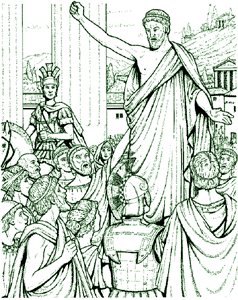 Given man's fallen nature, his attempts at the art of governance have always provided him with many opportunities to learn from failure. The progression from man's attempt to form effective government, to that government's corruption, and then to its final demise seems to be the only show that has never closed during mankind's long history.
Given man's fallen nature, his attempts at the art of governance have always provided him with many opportunities to learn from failure. The progression from man's attempt to form effective government, to that government's corruption, and then to its final demise seems to be the only show that has never closed during mankind's long history.
In their more indulgently individualistic moments, some are tempted to think that government is really a vestigial institution that we could do away with if we all just lived lives of sufficient self-discipline. These folks are also inclined to think we could do away with the need for church elders if we just applied ourselves to the individual study of the scriptures sufficiently. However, knowing our weakness, God has appointed rulers and elders to govern the state and the church in order that these institutions might be a guide and blessing to us. Because both of these offices are God-ordained, there need to be some people who are sufficiently prepared to effectively fill them.
Responsible Rhetoric
In order to form a government, a people must be drawn together and persuaded to live under a common rule. Whether this rule be under written law or monarchical powers, there will be little chance of organizing society around common principles, without rulers whose verbal and written skills are capable of swaying the populace. The study of rhetoric (the art of persuasion) must then be essential. Every society needs a group of citizens who are able to persuasively guide the populace towards a wise form of government.
How are we to develop such rulers? We must not be naive. Wisdom does not abhor a vacuum. In the same way that ignorance of theology is no aid in vital spirituality, the ability to rule wisely will not be developed without a thoughtful study of the art of governance as well as a broad familiarity with man's nature. Certainly some will be able to make wise choices without formal training, but they will be the exception.
Even though attempting to develop wise rulers may seem an arduous task, we can take comfort in the fact that we are certainly not plowing virgin soil when we take up this endeavor. Not only do the Scriptures provide much guidance, but history provides many opportunities to study the strengths and weaknesses of human nature. Many astute minds have given themselves to observing human action and trying to make insightful observations about it. Many great authors have been keenly aware of the problems man faces in attempting to form a government. These authors have also been keenly aware of the great need that man has for a government to keep his wicked inclinations in check.
Political Discernment
We often like to think of government as an abstraction that has a malleable existence of its own - a piece of steel that we need simply bend into the shape that we desire. But government is simply people, and its nature will be a direct reflection of the people who guide its institutions. It is no use dreaming up spell-binding visions of the ideal structure for government unless we are willing to do the hard work of raising up a generation of rulers who are capable of wisely wielding the power and responsibilities it involves.
What are some good books to start with to develop a young person with political discernment? A helpful introduction to effective political persuasion is Plato's Gorgias. In this delightful dialogue, Socrates tries to persuade three orators (someone akin to a politician and lawyer rolled into one) that they ought to use their persuasive powers for the betterment of their subjects rather than their own political ambitions and personal wealth. Central to Socrates' argument is the notion that every occupation must have some goal or end that it attempts to accomplish. Doctors attempt to instill health, pilots attempt to bring about a safe passage for their ships, but what is the purpose of an orator? What is the service he provides in return for the goods he receives from the state? The orator Callicles attempts to argue that the profession of orators need not have a particular aim. Rather, he claims that the orators have a right to fleece their subjects because they are able to hold sway over their minds with their rhetorical powers. He holds the "Intellectual might makes right" position. How does Socrates counter this position? Well, read it for yourself. (Penguin Classics has paperback edition of the Gorgias that is well annotated for the first-time reader.)
Plato's greatest and most thorough political work is the Republic. Socrates attempts to lay out the pattern for the ideal state. He makes many mistakes along the way, but the section I find most fascinating is Book IX. In this book he describes many of the weaknesses inherent in democracy that can cause it to dissolve into anarchy and ultimately tyranny.
Tacitus' The Annals of Imperial Rome and Thucydides' History of the Peloponnesian War are excellent for the wealth of historical detail they provide regarding the Athenian and Roman empires. They also provide a great deal of insight into man's desire for empire and the corrupting influences that it can have. These histories can provide us many more insights into human nature than we could ever hope to glean from our own personal experience.
As with most areas of great endeavor, we tend to blindly ignore the necessary labors that are needed in order to develop true political wisdom. Until we take up these labors and the persuasive powers that are needed to draw others to it, we will simply remain befuddled by our own political impotence.